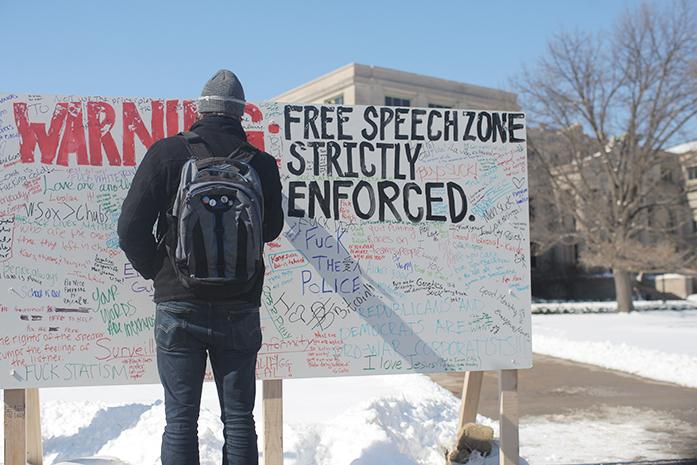Last week, the University of Iowa Alpha Phi sorority chapter was suspended by the university. The interim ruling, handed down after a video showing members of the sorority engaging in a song of questionable taste (putting it politely), prohibits the chapter from holding any organized activities without supervision from Alpha Phi International Headquarters staff or volunteers, alumnae advisers, or UI officials. It will be in place until the Panhellenic Council Justice Board resolves the complaint.
The chants in the video are distasteful and unbecoming without a doubt. It was clear that the sorority chapter would face some sort of punishment, given the amount of attention the incident received. But the suspension brings to mind an issue that has been quite contentious over the past few years: free speech on campus.
On today’s college campuses, advocates for free speech are coming head to head with those who are trying to guard against hate and create safe spaces for students. The latter group argues that racist, xenophobic, or otherwise bigoted views are allowed to propagate under policies that treat all speech as equal.
It is true that a consequence of unbridled free speech is that ugly expression comes along with it. But it is imperative to maintain the notion that universities are places in which ideas are exchanged and debated, not simply discarded on their face.
On Sept 14, President Obama, speaking at a town-hall meeting on college affordability in Des Moines, responded to a question about political bias on campuses. He ended up speaking on political correctness on campus.
“I’ve heard some college campuses where they don’t want to have a guest speaker who is too conservative or they don’t want to read a book if it has language that is offensive to African Americans or somehow sends a demeaning signal toward women. I’ve got to tell you, I don’t agree with that either,” Obama said. “I don’t agree that you, when you become students at colleges, have to be coddled and protected from different points of view.”
These different points of view are not always palatable, nor should they be. Speech can be shocking and provocative and still have value. Take last year’s controversy over the appearance of a statue depicting a Klansman on the Pentacrest. Created by UI Printmaking Fellow Serhat Tanyolacar, it was intended to weigh in on a discussion of race issues. But the statue was quickly taken down. The UI shortly thereafter issued a statement saying it had “no tolerance for racism,” and Sally Mason, the UI president at the time, sent out a statement apologizing for the statue.
The kneejerk reaction to expression that makes us uncomfortable is to remove it from our view. But as the U.S. Supreme Court has noted on numerous occasions, college campuses are not “enclaves free from the First Amendment.”
When Bruce Harreld takes his position as UI president in November, he may have to deal with issues like a viral video showing questionable conduct among fraternity or sorority members. Maybe even a controversial statue. When asked how he would handle controversies on campus at an open forum before his selection, Harreld said transparency was key to “get the issues out as quickly as possible.”
It’s the Daily Iowan Editorial Board’s hope that this transparency also includes a clear policy on speech at the UI, one that affirms the First Amendment rights of every student, faculty member, and staff member at this university.



